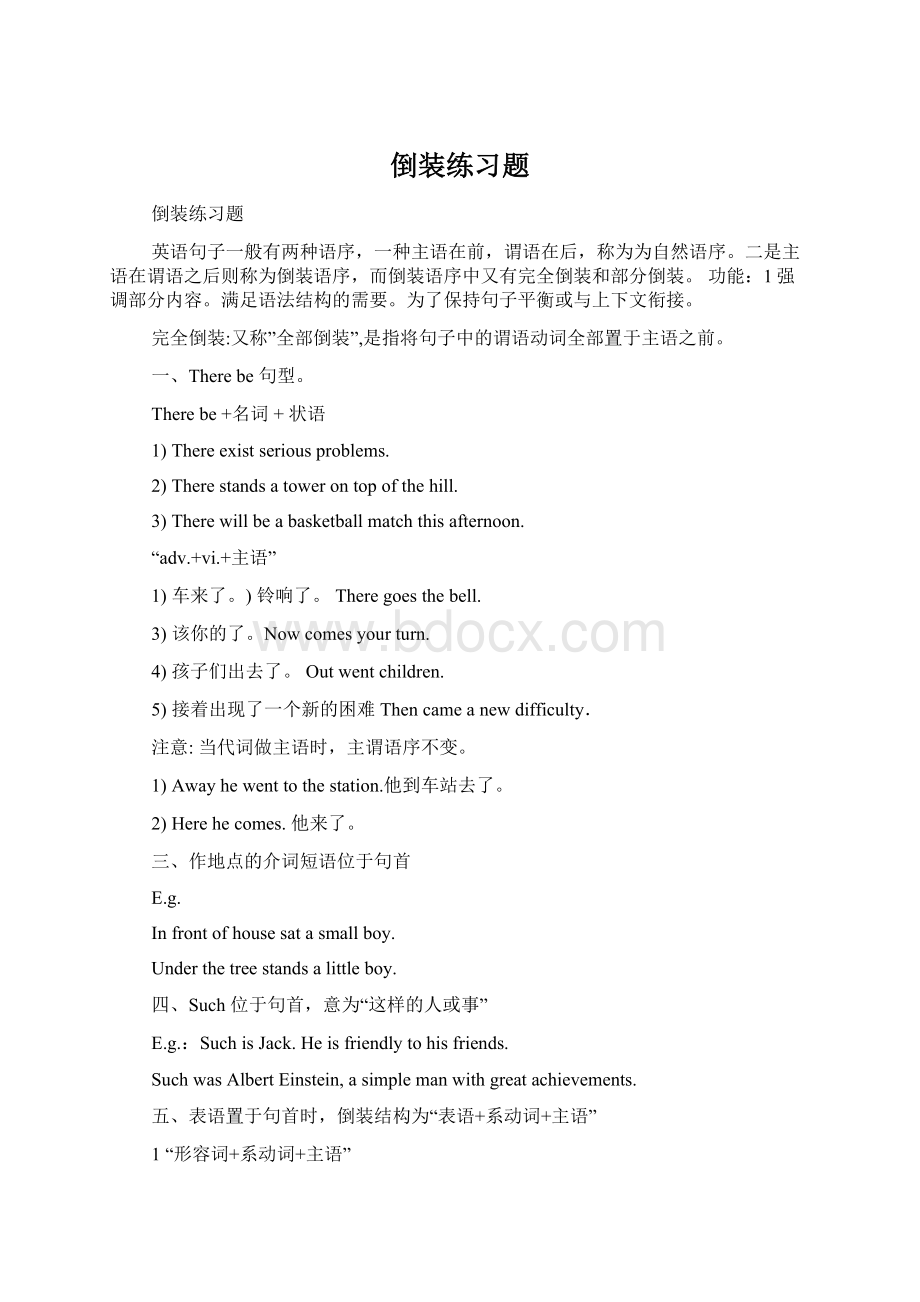倒装练习题.docx
《倒装练习题.docx》由会员分享,可在线阅读,更多相关《倒装练习题.docx(11页珍藏版)》请在冰豆网上搜索。

倒装练习题
倒装练习题
英语句子一般有两种语序,一种主语在前,谓语在后,称为为自然语序。
二是主语在谓语之后则称为倒装语序,而倒装语序中又有完全倒装和部分倒装。
功能:
1强调部分内容。
满足语法结构的需要。
为了保持句子平衡或与上下文衔接。
完全倒装:
又称”全部倒装”,是指将句子中的谓语动词全部置于主语之前。
一、Therebe句型。
Therebe+名词+状语
1)Thereexistseriousproblems.
2)Therestandsatowerontopofthehill.
3)Therewillbeabasketballmatchthisafternoon.
“adv.+vi.+主语”
1)车来了。
)铃响了。
Theregoesthebell.
3)该你的了。
Nowcomesyourturn.
4)孩子们出去了。
Outwentchildren.
5)接着出现了一个新的困难Thencameanewdifficulty.
注意:
当代词做主语时,主谓语序不变。
1)Awayhewenttothestation.他到车站去了。
2)Herehecomes.他来了。
三、作地点的介词短语位于句首
E.g.
Infrontofhousesatasmallboy.
Underthetreestandsalittleboy.
四、Such位于句首,意为“这样的人或事”
E.g.:
SuchisJack.Heisfriendlytohisfriends.
SuchwasAlbertEinstein,asimplemanwithgreatachievements.
五、表语置于句首时,倒装结构为“表语+系动词+主语”
1“形容词+系动词+主语”
E.g.:
PresentatthemeetingwereProfessorWhite,ProfessorSmithandmanyotherguests.
“过去分词+系动词+主语”
E.g.:
Gonearethedayswhentheycoulddowhattheyliked.
“介词短语+be+主语”
E.g.:
AmongthegoodsareChristmastrees,flowers,candlesandtoys.
部分倒装:
指将谓语的一部分如助动词、be动词或情态动词倒装至主语之前,而谓语动词无变化。
如果句子中没有这些词,则需在主语之前加助动词do/does/did等,而把原来的谓语动词变成原形放在主语之后。
一、用于疑问句
DoyouspeakEnglish?
二、“两种从句,两种句型,两种状语”
.两种从句
1.在省略if的虚拟条件句中,将were,had,should放在主语前,构成倒装。
WereIyou,Iwouldgotherewithhim.
Hadyoucomeearlier,youwouldhavemetMrSmithandhisdaughters.
Shoulditraintomorrowtomorrow,wewouldstayathome.
2.as/though引导的让步状语从句,要部分倒装。
Childas/thoughheis,heknowsalot.
2)Cleveras/thoughheis,hestudieshard..
3)Tryashemight,hecouldnotfindajob.
、两种句型
1、so,neither/nor放在句首,表示前面的情况也适用于另
一个人或物,要部分倒装。
此时谓语应与前句谓语结构一致。
构成”So+助动词/情态动词/be+主”。
1)Idon’tbuyproductsthatcausepollution.MostpeopleIknowdonotbuythem,either.
Idon’tbuy…,andneither/nordomostpeople.
2)HeworksinChongqingandsodoI.
注意:
当句中的两个谓语是不同种类的动词,或前面的句子有两个主语,一个是人,另一个是物时;前面的句子有两个相同的谓语动词,一是肯定形式,另一个
是否定形式时;前面的句子有两个相同的谓语动词,但时态不同时,应用”soitiswithsb.”或“Itisthesamewith…”结构。
E.g.:
1)---Tomisastudentandstudieshard.
---SoitiswithJohn.\ItisthesamewithJohn.
2)MarxwasborninGermanyandGermanwashisnativelanguage.
SoitwaswithEngles.
3)JohnlikesChinesebutheisnotgoodatit.SoitiswithMary.
Ilikeplayingfootball,butIdon’tlikeplayingbasketball.
SoitiswithMike.
表“的确如此”应为”so+主+助动词/情态动词/be动词”
E.g.:
---Heworkshard.
---Sohedoes.
2、so+形容词/副词+that;such+名词…that中的so,such位于句首,要部分倒装。
E.g.
1)Jimwassohappythathecouldn’thelpdancing.
SohappywasJimthathecouldn’thelpdancing.
2)Heissuchanoblepersonthatpeopleallrespecthim.
Suchanoblepersonishethatpeopleallrespecthim.
3)Soheavilywasitraining!
、两种状语
1、only所修饰的副词、介词短语或状语从句放在句首时,从句不倒装,
后面的主句要部分倒装。
E.g.:
Wecansavetheearthonlybychangingthewaywelive.
Onlybychangingthewaywelivecanwesavetheearth.
OnlyinthiswaycanyouleanEnglishwell.
OnlywhenhetoldmedidIrealizewhattroublehewasin.
OnlythendidIrealizeIhadlostmykey.
注意:
如果only修饰主语,则不倒装
E.g.:
Onlyheknowsthething.
2.频率状语提前,即副词always,often,nowandthen,manyatime等提前位于句首。
1)Manyatimehashecometoseeme.
2)OftenhaveItoldthemnottogoswimmingintheriver.
3)AlwaysdoesshegotoseehergrandmotheronSunday.
三、一个否定,一种祝福
一个否定:
否定词或词组即no,not,never,hardly,seldom,scarcely,
,bynomeans,常使1)NowherecouldIseehim.
2)Seldomdoeshegotoseeafilm.
3)NeverhaveIheardaboutit.
4)Bynomeansissmokingallowedintheclassroom.
5)Atnoplaceissmokingallowed.
注意:
1.Hardly/scarcely…when…和nosooner…than…,当hardly,nosooner放句首时,主句使用部分
倒装,且主句须用过去完成时,从句用一般过去时
1)Nosoonerhadhereachedhomethanitbegantorain.
2)Hardlyhadhegottothecinemawhenhisfatherphonedhim.
2。
否定副词如果只是限定句子主语而非修饰谓语或全句,则句子不必倒装;此外某些否定词,如not,no等修饰主语而不是做状语时,句子也不必倒装。
1)Nosurvivorhasyetbeenfound.
2)Notallthatglittersisgold.
一种祝福:
在表示祝愿的句子中,往往要求用倒装句。
常常将助动词
提前或直接将谓语动词置于主语前面,表示祝愿
1)LongliveChina!
中国万岁!
2)Mayyousucceed.祝你成功
四、三种特殊句型
1.句型:
notonly…butalso连接并列分句时,notonly置于句首,前一分句要部分倒装。
E.g.:
Notonlywasthecityseriouslypolluted,butalsothestreetswerecrowded.如果置于句首的notonly……butalso仅连接作主语的两个并列词组,则主语和谓语不倒装。
Notonlymenbutalsowomenandchildrenareaffectedbythenewlaw.
2.句型:
neither…nor…连接并列分句时,前后分句都倒装
E.g.:
Neitherishefoolish,norishelazy.
NeithershenorIamsatisfiedwithhisanswer.
3.句型:
notuntil…引导从句置于句首,后面的主句部分倒装。
“Notuntil+状语”放在句首,使用部分倒装。
“notuntil+状语从句”放在句首,也使用部分倒装,但注意从句不倒装,主句部分倒装。
E.g.:
1)Wewon’tbeabletoimprovethesituationuntilweknowmore.
Notuntilweknowmorewillwebeabletoimprovethesituation.
2)Notuntiltheycamedidweleaveouroffice.
3)
Notuntil194didthevillagehaveitsownschool.
Itwasnotuntilmidnightthathewentbackhomeaftertheexperiment.这是notuntil…的强调句形式。
强调句型:
Itis/was+被强调部分+that
。
完全倒装的情况:
一、Therebe句型。
Therebe+名词+状语
二、以表示地点或方位等的副词开头的句子,且主语是名词时,要完全倒装。
“adv
+vi+主语”
三、作地点的介词短语位于句首
四、Such位于句首,意为“这样的人或事”
五、表语置于句首时,倒装结构为“表语+系动词+主语”
部分倒装的情况:
一、用于疑问句
二、“两种从句,两种句型,两种状语”
.两种从句
1.在省略if的虚拟条件中,将were,had,should放在主语前,构成倒装。
2.as/though引导的让步状语从句,要部分倒装。
、两种句型
1、so,neither/nor放在句首,要部分倒装。
构成”So+助动
词/情态动词/be+主”。
2、so+形容词/副词+that;such+名词…that中的so,such位于句首,要部分倒装。
、两种状语
1、only所修饰状语放在句首时,从句不倒装,后面的主句要部分倒装。
2.频率状语提前。
三、一个否定,一种祝福
一个否定:
否定词或词组位于句首修饰谓语或全句,常使用部分倒装。
一种祝福:
用于某些表示祝愿的句子也要用倒装。
四、三种特殊句型
1.句型:
notonly…butalso连接并列分句时,notonly置于句首,前一分句要部分倒装。
2.句型:
neither…Nor…连接并列分句时,前后分句都倒装
3.句型:
notuntil…引导从句置于句首,后面的主句部分倒装。
倒装句练习
1.Look,________.
A.herethebuscomesB.hereisthebusconing
C.herecomesthebusD.herethebusiscoming
2.—WhereisKate?
—Look,_______,sheisattheschoolgate.
A.theresheisB.thereissheC.hereyouareD.hereitis
3.Whichofthefollowingsentencesiscorrect?
A.IntheteachercameB.Indidcometheteacher
C.IndidtheteachercomeD.Incametheteacher
4.Out_____,withastickinhishand.
A.didherushB.rushedheC.herushedD.hedidrush
5._______,heishonest.
A.AsheispoorB.PoorisheC.PoorasheisD.Poorasishe
6.________,heknowsalotofthings.
A.AchildasheisB.ChildasheisC.AchildasisheD.Childasishe
1.HismotherhadtalkedtohimformanyminuteswhilehewaswatchingTV,but____.
A.alittledidhehearB.littledidhehearC.littleheardheD.alittleheardhe
2.——Hello,ZhuHua.I’llhavetoreturntoCanadabecauseI’veworkedhereforayear.——_____!
A.Whattim?
fliesB.HowtimefliesC.WhatdoestimeflyD.Howdoestimefly
3.Duringthewar,____butalsohelosthiswifeandhischild.
A.notwashisjobinthelabtakenawayB.notonlywashisjobinthelabtakenaway
C.notmerelyhisjobinthelabwastakenawayD.notjustwastakenawayhisjobinthelab
4.——Wehavetostoptalkinghereoutside.Listen,_____!
——Hurryup,orwe’llbelate.
A.TheregoesthebellB.TheredoesthebellgoC.Therethebell
goesD.Goesthebellthere
5.Ithinkthisisthefirsttimethatwehavemet.___anywhere.
A.BeforehaveweneverseeneachotherB.Neverbeforewehaveseeneachother
C.EachotherhaveweseenneverbeforeD.Neverbeforehaveweseeneachother
6.___!
Youshouldtakethischancetoattendit.
A.HowimportantconferenceisitB.Howanimportantconferenceitis
C.WhatanimportantconferenceisitD.Whatanimportantconferenceitis
7.Shedidn’tcometothepartylastSunday.___,shemusthavemadethepartymoreexciting.
A.IfshecameB.WouldshecomeC.HadshecomeD.Didshecome
8.Theyfinallymanagedtoclimbtothetop,but__then.
A.wentthechildrendownthehillB.downthehilldidthechildrengo
C.downthehillwentthechildrenD.downthehillthechildrenwent
9.Ireceivedhismother’stelephonecallateleven.__thathewasbadlyhurtinanaccidentyesterday.
A.ThendidIknowB.OnlythenIknewC.OnlythendidIknowD.OnlythenknewI
10.——Whatsportdoyoulikebest?
——Springboarddiving.___todiveintowaterfromhighboard!
A.WhatafunisitB.HowfunitisC.HowafunisitD.Whatfunitis
11.——Theoldmanwouldn’tstayathomeforarestevenifitrained.
——____.Hewouldfeelsickifhestayedhomeforoneday.
A.SowouldmygrandpaB.Sowouldn’tmygrandpa
C.NeitherwouldmygrandpaD.Norwouldn’tmygrandpa
12.___forustosurfontheseainsummer!
A.WhatexcitingisitB.HowexcitingisitC.WhatexcitingitisD.Howexcitingitis
13.Bynomeans___toourplanforthetrip.
A.willsheagreeB.shewillagreeC.agreessheD.willagreeshe
14.Thechildtiptoedquietlytothebird.___intotheforestwhenhewasabouttocatchit.
A.FlewitawayB.AwayflewitC.AwayitflewD.Flewawayit
15.LittleTomisanorphan._____,hehastomakealivingbyhimself.
A.AchildasheisB.ChildasheisC.ChildasisheD.Achildthoughheis
16.___hegavethatweshouldtakemoreexerciseinoursparetime!
A.WhatagoodadviceB.HowagoodadviceC.WhatgoodadviceD.Howgoodadvice
17.Hardlyhadshewalkedoutofthewoods___sheheardthestrangescreamcomingfrombehindatree.
A.thanB.untilC.sinceD.when
18.___thatwecouldn’tcatchupwithhim.
A.SofastheranB.SofastdidherunC.SofastranheD.Suchfastdidherun
19.Wehavebeenondutyforfourhoursand____.
A.nowcomesyourturnB.nowdoesyourturncomeC.nowyourturn
comesD.comesnowyourturn
20.Wehaven’tseeneachotherformanymonths.__!
A.WhatImissedyouB.WhatdidImissyouC.HowImissedyouD.HowdidImissyou
21.__canyoufindouthowmanychickensthereare!
A.CountingthemB.BycountingthemC.Onlybycounti